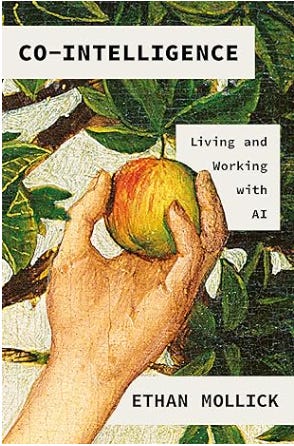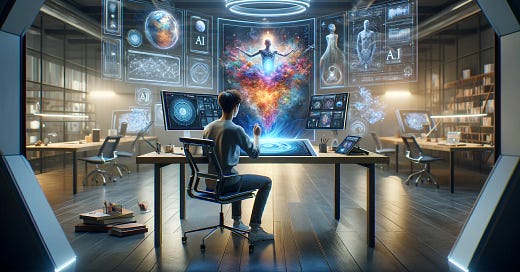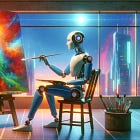Welcome to Polymathic Being, a place to explore counterintuitive insights across multiple domains. These essays take common topics and explore them from different perspectives and disciplines, to uncover unique insights and solutions.
Today's topic dives once more into the middle of techno-optimists and pessimists ripping social media and the news into two camps of utopia or apocalypse regarding our relationship with AI. Once again, I’m going to try to bridge the two with a pragmatic approach on how to use AI to augment intelligence.
Intro
AI continues to make a wonderful literary foil on which to analyze who we are as humans. Not a day goes by without something in the news or on social media either tech bros driving toward their goal of superintelligence (which isn’t too smart) or artists, authors, and others rending their garments about AI. (which also isn’t too smart) It’s why I still say that I hate AI but continue to find it exceptionally useful.
Artificial Intelligence is an unfortunate term in many ways. On the one hand, it doesn’t allow for the acceptance that it’s anything but artificial, fake, or manufactured. The AI over-hype these past couple of years doesn’t help this perception.
On the other hand, it triggers many people to consider it as opposing or in competition with natural intelligence, ie human intelligence. Especially in the art and literary world, there’s a very vocal bias, often resulting in shaming, that any use of AI is somehow an assault or an insult to the artistic endeavor.
The simple answer is that it’s… not simple. As we explored in “Can AI be Creative,” we find it really can’t, but humans are also not as creative as we like to believe.
Similarly, when it comes to the accusations that AI is stealing ‘real’ artists work, we found in “AI Is[n’t] Killing Artists” that all art education teaches you to copy the art of others to learn how to create something unique and new.
Once we step back and better understand how we engage in creative endeavors as humans, we can Beware the Binary and find out where AI can augment our capabilities while maximizing what makes human cognition unique
Augmenting Intelligence
I first played with the idea of Augmented[ing] Intelligence in my second novel, Integration where the AI, uploaded from human consciousness ponders:
“They might not be biologically human, but they certainly weren’t artificial. Maybe a better term for AI now would be augmented intelligence. Kira rubbed her eyes; they were still dealing with a lot of the same problems that had plagued humans for millennia. Even in the synthetic environment, what it meant to be human was a challenge they struggled with.”
As I’ve discussed earlier, our blindness to who we are, truly, is what I think is the most incredible opportunity we should be grabbing onto. AI makes a great augmentation for each of us to both understand our capabilities as well as improve them. Here are a few examples:
A year ago wrote a great essay titled On-boarding your AI intern. He’s also writen a lot more on the practical use of AI. He’s continued from there and written a new book called Co-Intelligence which continues the conversation.

who writes captured the power of AI augmentation for cocreation and harnessing it in a similar, yet faster method to ideate than what we have today. He uses the example of how a very vocal group of painters negatively reacted to photography in an almost identical way that some artists are reacting to AI today. I should note that photographers have been reacting to digital / cell phone photography similarly. But then that thread goes back to writing vs. oral storytelling, printing vs. scribes, etc., etc. throughout all of history
Another great example is writing who is constantly exploring the intersection of AI and our educational tools to help break the paradigm of rote classes and untailored curricula to help everyone learn better and faster. AI is transforming education and providing tools for improved learning. Here is a selection of his content.
The Critical Thinking Imperative: Thriving in an AI-Assisted Writing Landscape
Empowering Essays: The Impact of AI on Student Writing Processes
Transforming Education with SchoolAI: A New Era of Classroom Technology
A final call-out for augmenting our intelligence goes to who has a great practical substack called He’s constantly providing tips and tricks for how to get better results from the AI tools to help make work, art, and life easier:
Summary
I think it’s important to step back and understand how we humans process the world around us and then look at AI, not as artificial, fake, or replacing, but as Augmenting Intelligence and helping to avoid the binary divisions and unlock new capabilities.
When we are honest and critical about who we are, and then equally as honest and critical about what AI is, we find the synthesis that empowers our success. I don’t fear AI, I fear the conflict between those who can’t hold that nuance.
For one more practical application of AI in writing, I’d like to share this video I put together on how AI-augmented, but didn’t, and couldn’t, replace my writing process in my two novels about AI and what it means to be human, Paradox, and Integration:
Enjoyed this post? Hit the ❤️ button above or below because it helps more people discover Substacks like this one and that’s a great thing. Also please share here or in your network to help us grow.
Polymathic Being is a reader-supported publication. To receive new posts and support my work, consider becoming a free or paid subscriber.
Check Out Refind: Brain food, delivered daily
Every day, Refind analyzes thousands of articles and sends you only the best, tailored to your interests. Loved by 503,336 curious minds. Subscribe Here
Further Reading from Authors I Appreciate
I highly recommend the following Substacks for their great content and complementary explorations of topics that Polymathic Being shares.
- All-around great daily essays
- Insightful Life Tips and Tricks
- Highly useful insights into using AI for writing
- Integrating AI into education
- Computer Science for Everyone







![AI Is[n't] Killing Artists](https://substackcdn.com/image/fetch/w_140,h_140,c_fill,f_auto,q_auto:good,fl_progressive:steep,g_auto/https%3A%2F%2Fsubstack-post-media.s3.amazonaws.com%2Fpublic%2Fimages%2F48e90ab2-1185-4e39-afe9-4316457c7f59_2560x1440.jpeg)


Andrej Karpathy floated the idea of "Intelligence Amplification" as a mirror term to "Artificial Intelligence" earlier this year. It shares the same letters but in reverse. It positions itself as artificial tools that help us leverage our own intelligence rather than do our thinking for us. And so on. (https://x.com/karpathy/status/1744179910347039080?lang=en)
That resonates with me, so this post does as well.
Also, thanks for the shoutout!
I think you make a great point. AI can be treated just as another tool to help streamline many of the day-to-day tasks we take on.